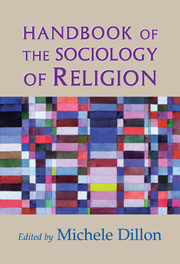Book contents
- Frontmatter
- Contents
- List of Contributors
- Acknowledgment
- Part One Religion as a Field of Sociological Knowledge
- Part Two Religion and Social Change
- 6 Demographic Methods for the Sociology of Religion
- 7 Church Attendance in the United States
- 8 The Dynamics of Religious Economies
- 9 Historicizing the Secularization Debate
- 10 Escaping the Procustean Bed
- 11 Religion and Spirituality
- Part Three Religion and the Life Course
- Part Four Religion and Social Identity
- Part Five Religion, Political Behavior, and Public Culture
- Part Six Religion and Socioeconomic Inequality
- References
- Index
9 - Historicizing the Secularization Debate
An Agenda for Research
Published online by Cambridge University Press: 05 June 2012
- Frontmatter
- Contents
- List of Contributors
- Acknowledgment
- Part One Religion as a Field of Sociological Knowledge
- Part Two Religion and Social Change
- 6 Demographic Methods for the Sociology of Religion
- 7 Church Attendance in the United States
- 8 The Dynamics of Religious Economies
- 9 Historicizing the Secularization Debate
- 10 Escaping the Procustean Bed
- 11 Religion and Spirituality
- Part Three Religion and the Life Course
- Part Four Religion and Social Identity
- Part Five Religion, Political Behavior, and Public Culture
- Part Six Religion and Socioeconomic Inequality
- References
- Index
Summary
The trends are quite clear: In most parts of the West, Christian belief and practice have declined significantly, at least since World War II, and probably for much longer (e.g., Ashford and Timms 1992; Davie 1999). The variations are also quite clear: In a few countries, such as Ireland and Poland, levels of belief and practice are still very high; in others, however, such as Sweden and Denmark, they are quite low.
But what do these trends and variations mean? And how might we explain them? Current thinking on these questions among sociologists of religion is dominated by two opposing positions. The first is classical secularization theory, which sees the recent decline of Christian religiosity as part of a general trend toward greater “secularity” and an inevitable consequence of “modernization.” The second is the “religious economies model.” It argues that transhistorical and cross-national variations in “religious vitality” are caused by differences in the structure of “religious markets,” and, more specifically, that the freer religious markets are, the more vital religion will be.
Who is right? The diehard defenders of secularization theory? Or their upstart critics from the religious economies school? In my view, the answer is “probably neither.” I say “neither” because there is now a great deal of evidence which speaks against both of these theories – against the view that modernization inevitably undermines religion and against the view that “free markets” (in religion) generally promote it – evidence, moreover, which seems better accounted for by other theoretical perspectives that have been forgotten or ignored in the recent debate.
- Type
- Chapter
- Information
- Handbook of the Sociology of Religion , pp. 110 - 122Publisher: Cambridge University PressPrint publication year: 2003
- 57
- Cited by



